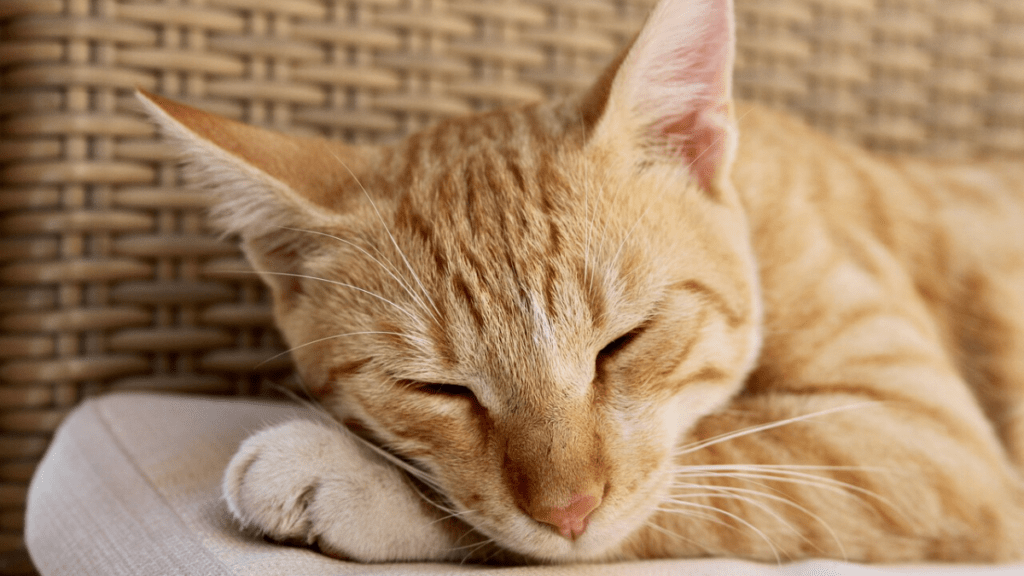Felines tend to experience urinary tract conditions more often than canines. One such condition that appears to be unique to cats is called idiopathic cystitis. This syndrome occurs due to a cat’s inability to handle stress, which produces symptoms similar to a urinary tract infection (UTI) without bacteria being present in the urinary tract. Idiopathic cystitis is more likely to occur in younger cats than in seniors.
The feline bladder is lined with glycoproteins that protect the bladder tissue from urine. The pH level of urine can vary, and urine also may contain crystals and toxins that have been removed from the bloodstream and concentrated. The composition of urine is abrasive to the tissue that lines the bladder, which is why the bladder needs a strong lining of glycoproteins. Cats that experience idiopathic cystitis have patchy glycoprotein layers, so the bladder tissue is exposed to urine and can become inflamed.
The lining of these cats’ bladders becomes patchy when the cats experience anxiety or stress. This condition is quite uncomfortable, and pain management is an important component of treatment. Prevention of future cystitis episodes is very important to prevent such discomfort from happening again.
Cats that experience cystitis are actually neurologically different: their brains control hormones differently than other cats. They are more reactive to environmental changes, as well as more anxious and sensitive to pain. These cats tend to need predictable environments in order to prevent cystitis episodes. They do better when they consistently eat the same food, have the same schedule, eat separate from other animals, and have their own safe spaces to occupy when desired.
Veterinarians used to try to manage idiopathic cystitis by addressing any crystals in the urine, changes in urine pH, and the patchy bladder lining. More recently, we are discovering that the most effective approach is to focus on the cause of a cat’s stress. If we can define and mitigate the stress that triggered the bout of idiopathic cystitis, then the cystitis itself will resolve. As the veterinary community works to understand this complex issue, we have observed some defining features of idiopathic cystitis:
The feline bladder is lined with glycoproteins that protect the bladder tissue from urine. The pH level of urine can vary, and urine also may contain crystals and toxins that have been removed from the bloodstream and concentrated. The composition of urine is abrasive to the tissue that lines the bladder, which is why the bladder needs a strong lining of glycoproteins. Cats that experience idiopathic cystitis have patchy glycoprotein layers, so the bladder tissue is exposed to urine and can become inflamed.
The lining of these cats’ bladders becomes patchy when the cats experience anxiety or stress. This condition is quite uncomfortable, and pain management is an important component of treatment. Prevention of future cystitis episodes is very important to prevent such discomfort from happening again.
Cats that experience cystitis are actually neurologically different: their brains control hormones differently than other cats. They are more reactive to environmental changes, as well as more anxious and sensitive to pain. These cats tend to need predictable environments in order to prevent cystitis episodes. They do better when they consistently eat the same food, have the same schedule, eat separate from other animals, and have their own safe spaces to occupy when desired.
Veterinarians used to try to manage idiopathic cystitis by addressing any crystals in the urine, changes in urine pH, and the patchy bladder lining. More recently, we are discovering that the most effective approach is to focus on the cause of a cat’s stress. If we can define and mitigate the stress that triggered the bout of idiopathic cystitis, then the cystitis itself will resolve. As the veterinary community works to understand this complex issue, we have observed some defining features of idiopathic cystitis:
- This is usually not a "one-and-done" type of issue. Cats that experieince an episode of cystitis are likely to have future episodes, depending on their environment.
- Environmental changes and/or stressors are associated with bouts of cystitis.
- Cystitis episodes tend to be less frequent as a cat ages.
Treating an episode that is already in progress (and the symptoms associated with it) is difficult and usually fails. Prevention of future cystitis episodes is more likely to be successful. We can only manage symptoms and pain associated with a bout of cystitis as we wait for that episode to end.
Idiopathic cystitis episodes can be triggered by any of the following examples:
Idiopathic cystitis episodes can be triggered by any of the following examples:
- Human stress (such as arguments or sickness)
- People or animals moving into or out of their home
- Construction in the home or nearby that creates noise or disturbance
- Weather changes
- New furniture or changes to furniture arrangement
- Moving to a new home
- Changes in diet
- Alterations in human schedules
- Stray cats walking around outside the home
- Changes in season (especially around springtime)
Remember that cats who are predisposed to idiopathic cystitis are very sensitive. Events that we as pet owners perceive as minimal can be monumental to these cats and trigger a flare-up of symptoms.
The best way to prevent future episodes is to provide environmental enrichment. These cats need choices of different areas to play, rest, eat and use the litter box. They do well when they are given a private area where they can sleep, eat and eliminate away from other people or pets.
As a pet owner, here are some things you can do for your cats who experience idiopathic cystitis:
The best way to prevent future episodes is to provide environmental enrichment. These cats need choices of different areas to play, rest, eat and use the litter box. They do well when they are given a private area where they can sleep, eat and eliminate away from other people or pets.
As a pet owner, here are some things you can do for your cats who experience idiopathic cystitis:
- Give your cat opportunities to play with you and other cats.
- Allow your cat to move freely about the home.
- Provide scratching posts.
- Rotate toys regularly.
- Have one litter box for each cat in the home, plus one extra.
- Keep litter boxes in well-ventilated areas and clean them regularly.
- If your home has multiple floors, make sure there is at least one litter box on each floor.
- Give each pet their own food and water bowls, and place feeding stations in areas where pets will not be startled by other pets or loud noises.
- Feed the same brand, flavor and type of food whenever possible.
On top of environmental enrichment, adding water and a supplement called Cosequin to your cat’s diet may help prevent future episodes. Cosequin may help to repair the glycoprotein lining of the bladder. Increased fluid intake through canned foods can dilute the urine and promote increased urine output. Adding water to canned foods is an even better option. Water “treats” like tuna water or low-sodium chicken broth and water fountains may encourage cats to drink more.
Feline Idiopathic Cystitis is a challenging condition to manage. Don’t hesitate to involve your veterinarian. They can provide valuable insight to help control symptoms during current episodes and prevent future bouts from ever occurring.






